- Home
- Ann M. Martin
Baby-Sitters Club 061 Page 6
Baby-Sitters Club 061 Read online
Page 6
Carrie Steinfeld ran out of the room and returned in a flash with the kit. Madame took a white stick of smelling salts out of the box and waved it under Mary's nose. Mary's eyes fluttered, and she began to cough.
Madame asked for a chair and told Mary to sit on it with her head down between her knees. Just then, Mme Dupre stuck her head into the room. "What's wrong?" she asked.
"Madame, call ze emergency rescue squad, s'il vous plait," Mme Noelle said to her.
"No!" Mary cried, her eyes now open wide. She sat up straight. "It's just a virus. I'll be fine. Please." Another virus? I thought. No way! Mme Noelle studied Mary, her sharp eyes boring into her. She put her hand on Mary's forehead. "No fever. Are you dizzy now, mademoiselle?" she asked.
Mary shook her head. "No, not at all," she replied.
Madame stood up. "Will you ask ze receptionist to call Mary's parents?" she asked Mme Dupre, who was waiting in the doorway. "Someone must come to get her." "Of course;" replied Mme Dupre.
"Mademoiselle Bramstedt, I wish you to dress and wait in ze lobby. But do not leave without speaking to me. I wish to talk wiss your fazzer or muzzer." "I'll go with her," I volunteered quickly. I needed to talk to Mary, and I couldn't wait a moment longer.
"Yes, a good idea," Madame agreed. "She should not be alone." Slowly, Mary got to her feet and we left the studio. I didn't say anything until we were alone in the dressing room. Truthfully, I wasn't sure what I was going to say until I opened my mouth.
"Mary, I think you should stop dieting," I said directly.
"What do you know about it? You're just a kid!" Mary snapped at me.
I was stunned. She'd never spoken to me like that before. I remembered that Mary Anne had said moodiness and irritability were a sign of anorexia, so I pushed on. "Do you know what anorexia is?" I asked.
Mary's eyes narrowed angrily. "Yes, I know what it is! And I am not anorexic." "Maybe not yet, but you're headed in that direction," I said, my voice rising. "You have all the symptoms." "I didn't know you were a medical authority," Mary scoffed as she slipped out of her leotard. I saw that she was even thinner than the week before.
"My friends and I looked it up in a book." "Why?" demanded Mary.
"Because I was telling them how worried I am about you." Mary's hands flew to her thin hips. "You told your friends I have anorexia?" she exploded. "How dare you! Besides, it's a lie." "Mary, I care about you, and you need help." As the words came out of my mouth, I knew beyond any doubt they were true.
Mary's face went bright red. In a rage, she threw her dance bag against the wall. "This is not your business!" she cried, stepping close to me. "I can handle it myself. Don't you talk to anyone else about this!" Suddenly, I realized my hands were trembling. No one had ever screamed in my face before. Tears were brimming in my eyes but I fought them back.
As Mary and I stood facing one another, Mme Dupre looked in. "Is there a problem?" she asked, her eyes darting from Mary to me.
"No. No problem," said Mary, quickly going back to her dressing.
Mme Dupre looked at me questioningly, but said nothing.
When she was gone, Mary turned to me. "I'm sorry, Jessi. I've been in a bad mood lately, but it's nothing for you to worry about. Sorry I got so bent out of shape." "Get some help, Mary," I repeated. "Please?" She turned her back to me and pulled on her jacket. After that, she ignored me as we walked to the lobby. When we got there a man was speaking with Mme Noelle. I assumed from the resemblance to Mary that he was her father. Both he and Madame seemed very serious.
"I suggested to your fazzer zat you consult a doctor about zis virus," Mme Noelle told Mary when we approached them.
"I just need to get to bed," Mary said.
"Perhaps some chicken soup," Madame suggested.
Mary nodded. I prayed she'd take Mme Noelle's advice - it was wiser than Madame probably realized.
Chapter 10.
I smiled as soon as I walked into the kids' class on the following Tuesday. Devon was back! He stood with two of his pals, laughing, as if he'd never been away.
Maybe he'd just been ill the week before. But I thought something else had happened. Maybe he had decided not to return to class, but then had missed it too much to stay away. Something very subtle had changed about him. For one thing, he wasn't running around the room like a maniac before class.
For that matter, something had changed in all the kids. They no longer seemed as wild as when we'd first met. Now when Mme Dupre walked into class she didn't need to dim the lights. Her presence was enough to quiet the kids down.
Mr. Tsuji began to play a lively melody and Madame asked me to lead the warm-ups. The kids had come to know the stretching and bending exercises well.
As I worked with the class, I looked over at Mary. Her baggy Tuesday dance wear seemed even baggier. Her eyes appeared larger and her cheekbones higher. I guess getting thinner made her features stand out more. I wondered if she'd been to the doctor as Mme Noelle had suggested. Perhaps a doctor would catch on to what was happening and could talk some sense into Mary.
I hadn't spoken to her since the other day. And today, in the dressing room, she hadn't made eye contact with me even once. I was sure she was avoiding me.
When the warm-ups were finished, Mme Dupre taught the class some small jumps called echappe (which means "escape"). These jumps can be done from several ballet positions. Madame asked the kids to stand in second position and jump straight up, pointing their toes, then land again in second position.
The room exploded with thuds as the kids jumped and landed. It seemed to me that even the windows shook.
After awhile Mme Dupre broke the class into groups. These groups were different than the ones they'd been in before. I wasn't surprised to see that Madame had separated Nora from Jane, and that Devon was nowhere near his friends.
Today the kids were really going to learn to do a pas de chat correctly. Each of us volunteers was assigned a group. Mary worked with Devon's group. This was a switch because up until this time Mme Dupre had always paired him with Raul. That was Mme Dupre for you, forever watching, making adjustments, and thinking.
Martha was in my group. I couldn't believe how shy she was even after all this time. I never saw her speak to any other kid. She barely even looked at anyone.
But she could dance! Although a pas de chat is one of the first jumps that children learn, I thought it was ambitious of Madame [to try to teach it in this class. In a way, I understood why she chose it. It doesn't require a lot of strength, and kids like the idea of a jumping cat. And they love to jump.
A pas de chat does require a certain amount of experience, though. At least if you want it to look right.
Which brings me back to Martha. By only her third try, her jump was very close to being exactly right. She was a natural - from the way she held her arms, to her posture, to the way she lifted her chin. And she Jumped higher than any of the other kids. "Are you sure you never took lessons?" I asked after she came down lightly from her jump.
"Five," she said in her soft voice.
"What?" I asked.
"I took five lessons once." "But why did you stop? You're so good." She smiled, then looked away and shrugged. "I just stopped, that's all." "Well, you should start again. You have a real gift," I told her.
Martha ducked her head and wouldn't look at me, but she was smiling. It was the very first time I'd seen her smile.
As I worked with the other kids I glanced over to Mary's group - in time to see Devon leap into the air. His movements were way too large and uncontrolled. He had great energy and dramatic flair, though. When he was done, Mary walked him slowly through the proper positions.
It occurred to me that each one had something to offer the other. Devon needed Mary's technical knowledge, and Mary needed some of Devon's fire in her dancing.
What a change in Devon, too. He listened to Mary, absorbing her every word. It was clear he'd made up his mind to get serious.
Class went by so qu
ickly that when the first mother arrived, I thought she had come extra early. She hadn't. It was actually time to leave.
"Wonderful work," Mme Dupre told the class. "I will see you next week." "Good going, kids," I said to my group. They smiled at me and then headed for the door. "Especially you," I whispered into Martha's ear when the others were a little distance away.
What she did then took me by surprise. She turned and wrapped me in a quick, tight hug. Then she ran off to the doorway where her mother was waiting for her.
Want to hear something funny? I got this big lump in my throat and felt like I was going to cry.
What a weird feeling. I was really happy, but fighting back tears at the same time. Until that moment, only certain parts of some ballets and the end of the movie It's a Wonderful Life had made me feel that way. This was the first time real life had given me that crying-happy feeling.
Again, I saw Martha's regal-looking mother staring at me. I wanted to speak to her, but the lump was still in my throat. I wasn't sure I could talk. I looked at the ceiling and tried to pull myself together. When I looked back, Martha and her mother were gone.
"Good class, huh?" said Sue, joining me.
"It sure was," I agreed, clearing my throat.
"Want to go to the King for a snack?" she asked me.
"Yeah, is everyone going?" "I think so. Hey, Mary," Sue called to her. "Are you coming to Burger King?" "Thanks, but I can't," Mary said, avoiding my eyes. "I have to go running." "In this cold weather!" Sue yelped.
"You don't feel it when you run," Mary replied.
"I'd feel it," said Sue, laughing. "See you in the dressing room, Jessi," she told me as she left.
"Aren't you supposed to be taking it easy?" I asked Mary before she could get away from me.
"I'm all better," Mary said. "Stop worrying about me, okay? You sound like my mother and it's really starting to bug me." "Sorry," I said. "But why don't you come with us?" "Jessi!" Mary snapped. "Chill out! All right?" "All right," I said.
"Come on, Jessi," Darcy called to me from the doorway.
"I'm coming," I said, walking away from Mary.
Maybe Mary was right. Maybe I was making a big deal over nothing. Maybe Mary was doing what was necessary to keep her ballet career going, and she didn't need me hassling her about it. Besides, it wasn't my problem or any of my business.
That's what I told myself as I headed for the dressing room. But I didn't believe it.
Chapter 11.
On Tuesday, when I got home from my class, a letter was waiting for me from Quint. I tore it open, hoping he'd have some advice about Mary.
After a few words about what was happening with him (school, ballet class, that sort of thing) he plunged right into the topic. "Dieting!" he wrote in capital letters. "That's the number one topic among a certain group of girls in my ballet class. It drives me crazy, but I feel sorry for them, too. They think they're under a lot of pressure to look a certain way. It's not half as bad for a guy. In ballet guys don't have to look as uniform as girls. Some girls wind up with only two choices - diet like mad, or drop out. I can't imagine having to make that choice, not after spending my whole life involved in ballet. Those girls wouldn't have to quit dancing altogether, of course. A lot of them go into theatrical dancing, like on Broadway and in traveling shows. Others become teachers." Quint's letter made me feel better. At least Mary wasn't the only person with this problem. "Weight can be a big problem in dancing," Quint went on. "A lot of people say that the physical standard for ballerinas isn't realistic. If you look at pictures of old-time dancers - ones that were stars - you see that they're not nearly as thin as dancers today. I think the trend now is for dancers to be a little heavier than they have been recently. It's happening slowly, but you can notice it when you go to the ballet." (I'm really envious that Quint lives in the city and goes to see the top ballets all the time!) "Maybe if you tell this to Mary, she'll feel better." I was definitely going to tell that to Mary. If she would talk to me, that was! "Oh, I had a great idea the other day," Quint wrote in the next paragraph. "You made me think of it when you asked about the minority thing. Yeah, it is rougher if you're a minority. There's no sense saying it's not. And in ballet it's for the same reason that some girls find themselves dieting like crazy. There's this idea that everyone in the corps de ballet should look alike. People used to be (and sometimes still are) afraid to pair a non-white guy with a white ballerina (or vice versa) in a pas de deux. That's changing, though. There are non-white dancers in the corps de ballet now, and more and more mixed couples dancing - especially in the modern pieces." This was all very interesting, but I was getting impatient to hear Quint's great idea. Finally he came to it.
"Here's my idea. Why don't you talk to Mme Dupre about offering a scholarship to a couple of the kids who seem very gifted. They might be white or not, but the point is, they would be kids who otherwise couldn't afford class. The school probably won't go for it, but it's an idea, anyway." Quint finished his letter with some encouraging thoughts about spring break and how we could arrange to meet. He writes such great letters. This one was a little more formal than most of them, but that might have been because of the serious subject.
His scholarship idea was pretty awesome. Did I have the nerve to suggest it? I wasn't sure. Mama always tells me just to speak up. "The worst that can happen is that someone will say no," she tells me. Which is true. But sometimes shyness gets the best of me. I'm not shy with kids my own age. With adults sometimes my tongue ties up into a knot. I couldn't exactly picture myself walking up to Mme Dupre and suggesting the school donate thousands of dollars worth of scholarship money. Besides, Mme Dupre would probably tell me to discuss it with Mme Noelle. Now there was an intimidating thought! I really didn't think the school would give out scholarships just because an eleven-year-old told them to.
Or would they? I had to think about it some more.
I was folding Quint's letter when the phone rang. "It's for you, Jessi," Aunt Cecelia called from the kitchen. I picked up the extension in the living room.
"Hi," Kristy said. "How's it going?" "Okay." "Listen, are you free to sit at my house this Saturday?" she asked. "Or are you going to the fair at Shannon's school, like everybody else?" "Oh, yeah, they asked me to come but I have some studying to do," I said. "I could sit for a couple of hours, though." "Good, because I promised to go to a planning meeting at school for the spring dance. I'll only be gone a few hours myself. Can you come over at two?" "No problem," I said.
"Thanks, 'bye." " 'Bye." I laid the phone down gently as Aunt Cecelia came in.
"You look pretty faraway," she commented. "What's on your mind?" "Aunt Cecelia, what would you do if someone you knew was hurting herself and she didn't even realize it?" I asked.
Aunt Cecelia sat on the chair across from me. "Does this have to do with drugs?" she asked.
"No, dieting," I told her. "Too much dieting." "Hmmm." Aunt Cecelia sat back in the chair thoughtfully. "You might have to tell an adult who knows this person about what's happening with her." "Isn't that tattling, though?" "Not if your friend's health is at stake. Doesn't anyone else around her notice this?" "So far, no one seems to think anything of it," I told her. "My friend is pretty good at hiding it. She pretends to eat and she wears big clothes." "Are you sure there's a problem?" Aunt Cecelia questioned.
I thought about this. "Eighty percent sure," I estimated.
"You have good instincts, Jessi. Go with your gut," said Aunt Cecelia. "I think you should tell someone." "Thanks. That's what I was thinking. I was just hoping there was another way." "There's an expression," said Aunt Cecelia. "You have to be cruel to be kind." "What does that mean?" I asked.
"It means that the best thing to do for a person you care about isn't always the easiest thing. It might even make the person mad at you." "Oh, it will!" I assured her. "She will be super mad at me. That's for sure." "Someday she'll realize you were being a true friend," said Aunt Cecelia.
"I hope so," I re
plied. Somehow I had my doubts about that.
Chapter 12.
Snow! That was the good news when Claudia sat for the Kormans before our Wednesday BSC meeting. The Korman kids have lots of energy, so taking them outside to play in the snow is a terrific way to keep them busy (and also tire them out a little).
They were already bundled up and ready when Claudia arrived. One-and-a-half-year-old Skylar was so excited about going out that she didn't even cry when Mrs. Korman left. (She did yell, "Mommy!" and look pitiful for awhile, but that's much better than usual.) Snow had been falling all day. Now it was just flurrying and almost four inches of crisp, feathery snow lay on the ground - ,the perfect kind for packing.
Nine-year-old Bill and seven-year-old Melody immediately began rolling a ball for a snowman in their large front yard. (The Kormans live in Kristy's neighborhood where the houses all have huge front and back yards.) They hadn't gotten very far when a snowball came skidding past them.
"War!" Bill cried gleefully as he began packing a snowball for his retaliation on this unseen attacker.
Linny and Hannie Papadakis came laughing into the yard, their arms loaded with snow- balls. Linny and Bill didn't waste a minute. They began bombarding one another with snowballs, ducking and shouting all the while.
"Hey! Hey! Be careful," Claudia cautioned, half laughing as a snowball flew past her shoulder.
"Ow!" Melody cried. A snowball had hit her smack in the chest.
"Take this!" yelled Hannie, hurling a snowball at Linny. Her snowball flew high into the air and crumbled before it dropped to the ground. Hannie isn't exactly the world's greatest snowball maker, or much of a pitcher.
"Girls against boys!" Bill cried, joining forces with Linny. They lobbed a hail of snowballs at the girls, packing them as quickly as they threw them.
Melody and Hannie knew a losing battle when they saw one. They fought back for about two minutes and then ran for cover behind Claudia. "No fair!" Claudia protested as she held up her arms to ward off the shower of snowballs the boys were now directing her way. "I'm not a human fort." "Are you building a fort?" cried eight-year-old Maria Kilbourne who had come running into the yard. "Can I help? I'm good at it!" "That's a great idea," said Claudia as a snowball flew past her ear.

 Karen's Tea Party
Karen's Tea Party Kristy and the Snobs
Kristy and the Snobs Best Kept Secret
Best Kept Secret Karen's Kittens
Karen's Kittens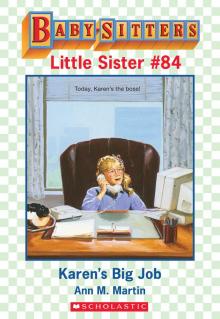 Karen's Big Job
Karen's Big Job Claudia and the Genius of Elm Street
Claudia and the Genius of Elm Street The Fire at Mary Anne's House
The Fire at Mary Anne's House Science Fair
Science Fair Me and Katie (The Pest)
Me and Katie (The Pest) Karen's Plane Trip
Karen's Plane Trip Jessi's Wish
Jessi's Wish Dawn and Too Many Sitters
Dawn and Too Many Sitters Jessi and the Jewel Thieves
Jessi and the Jewel Thieves Eleven Kids, One Summer
Eleven Kids, One Summer Karen's Goldfish
Karen's Goldfish Snow War
Snow War Abby and the Secret Society
Abby and the Secret Society Keeping Secrets
Keeping Secrets Good-Bye Stacey, Good-Bye
Good-Bye Stacey, Good-Bye Karen's Sleepover
Karen's Sleepover Claudia and the World's Cutest Baby
Claudia and the World's Cutest Baby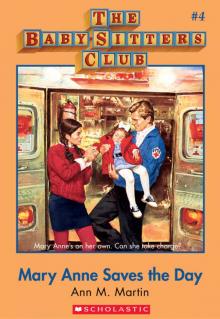 Mary Anne Saves the Day
Mary Anne Saves the Day Mallory and the Dream Horse
Mallory and the Dream Horse Kristy and the Mystery Train
Kristy and the Mystery Train Dawn's Family Feud
Dawn's Family Feud Karen's Twin
Karen's Twin Little Miss Stoneybrook... And Dawn
Little Miss Stoneybrook... And Dawn Karen's Mistake
Karen's Mistake Karen's Movie Star
Karen's Movie Star Mallory and the Mystery Diary
Mallory and the Mystery Diary Karen's Monsters
Karen's Monsters Kristy + Bart = ?
Kristy + Bart = ? Karen's Dinosaur
Karen's Dinosaur Here Today
Here Today Karen's Carnival
Karen's Carnival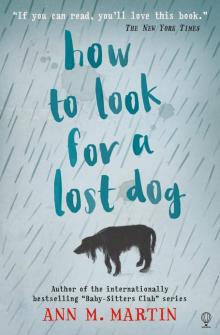 How to Look for a Lost Dog
How to Look for a Lost Dog Stacey vs. Claudia
Stacey vs. Claudia Stacey's Ex-Boyfriend
Stacey's Ex-Boyfriend Here Come the Bridesmaids!
Here Come the Bridesmaids! Graduation Day
Graduation Day Kristy's Big News
Kristy's Big News Karen's School Surprise
Karen's School Surprise Kristy Thomas, Dog Trainer
Kristy Thomas, Dog Trainer Baby-Sitters' Christmas Chiller
Baby-Sitters' Christmas Chiller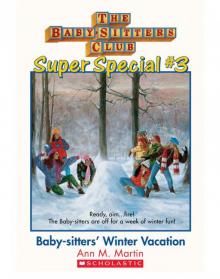 Baby-Sitters' Winter Vacation
Baby-Sitters' Winter Vacation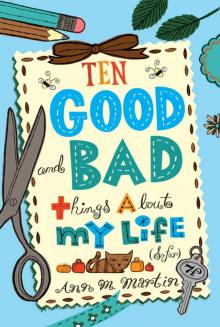 Ten Good and Bad Things About My Life
Ten Good and Bad Things About My Life Claudia and the Bad Joke
Claudia and the Bad Joke Mary Anne's Makeover
Mary Anne's Makeover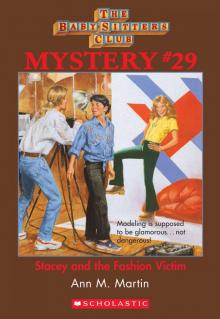 Stacey and the Fashion Victim
Stacey and the Fashion Victim Dawn Schafer, Undercover Baby-Sitter
Dawn Schafer, Undercover Baby-Sitter Karen's Tuba
Karen's Tuba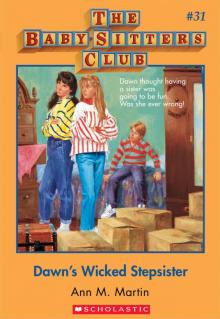 Dawn's Wicked Stepsister
Dawn's Wicked Stepsister Diary Three: Dawn, Sunny, Maggie, Amalia, and Ducky
Diary Three: Dawn, Sunny, Maggie, Amalia, and Ducky Karen's Nanny
Karen's Nanny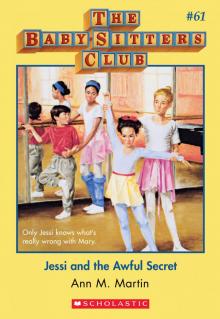 Jessi and the Awful Secret
Jessi and the Awful Secret Karen's New Year
Karen's New Year Karen's Candy
Karen's Candy Karen's President
Karen's President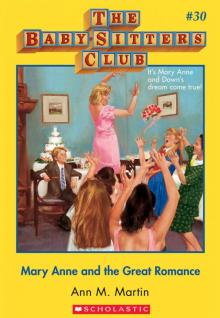 Mary Anne and the Great Romance
Mary Anne and the Great Romance Mary Anne + 2 Many Babies
Mary Anne + 2 Many Babies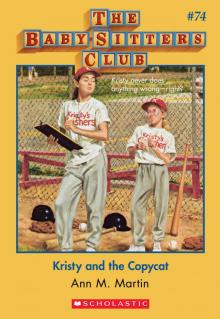 Kristy and the Copycat
Kristy and the Copycat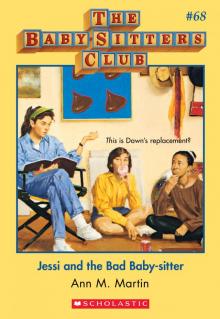 Jessi and the Bad Baby-Sitter
Jessi and the Bad Baby-Sitter Claudia, Queen of the Seventh Grade
Claudia, Queen of the Seventh Grade Claudia and the Lighthouse Ghost
Claudia and the Lighthouse Ghost Karen's New Puppy
Karen's New Puppy Karen's Home Run
Karen's Home Run Karen's Chain Letter
Karen's Chain Letter Kristy in Charge
Kristy in Charge Karen's Angel
Karen's Angel Mary Anne and Too Many Boys
Mary Anne and Too Many Boys Karen's Big Fight
Karen's Big Fight Karen's Spy Mystery
Karen's Spy Mystery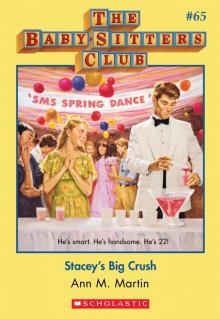 Stacey's Big Crush
Stacey's Big Crush Karen's School
Karen's School Claudia and the Terrible Truth
Claudia and the Terrible Truth Karen's Cowboy
Karen's Cowboy The Summer Before
The Summer Before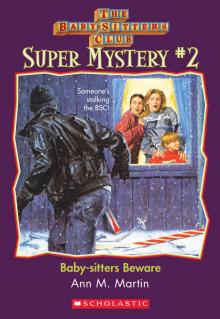 Beware, Dawn!
Beware, Dawn! Belle Teale
Belle Teale Claudia's Big Party
Claudia's Big Party The Secret Life of Mary Anne Spier
The Secret Life of Mary Anne Spier Karen's Book
Karen's Book Teacher's Pet
Teacher's Pet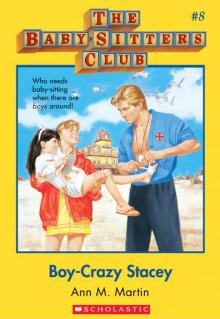 Boy-Crazy Stacey
Boy-Crazy Stacey Claudia and the Disaster Date
Claudia and the Disaster Date Author Day
Author Day Claudia and the Sad Good-Bye
Claudia and the Sad Good-Bye Kristy and the Worst Kid Ever
Kristy and the Worst Kid Ever Yours Turly, Shirley
Yours Turly, Shirley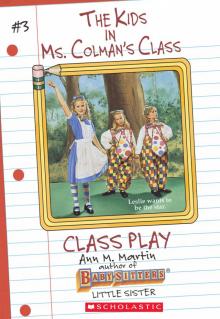 Class Play
Class Play Kristy and the Vampires
Kristy and the Vampires Kristy and the Cat Burglar
Kristy and the Cat Burglar Karen's Pumpkin Patch
Karen's Pumpkin Patch Stacey and the Mystery at the Empty House
Stacey and the Mystery at the Empty House Karen's Chicken Pox
Karen's Chicken Pox Mary Anne and the Playground Fight
Mary Anne and the Playground Fight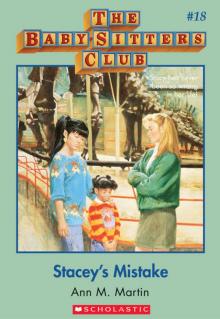 Stacey's Mistake
Stacey's Mistake Coming Apart
Coming Apart Mary Anne and the Little Princess
Mary Anne and the Little Princess Karen, Hannie and Nancy: The Three Musketeers
Karen, Hannie and Nancy: The Three Musketeers 'Tis the Season
'Tis the Season Claudia and Mean Janine
Claudia and Mean Janine Karen's School Bus
Karen's School Bus Mary Anne's Big Breakup
Mary Anne's Big Breakup Rain Reign
Rain Reign Claudia and the Mystery at the Museum
Claudia and the Mystery at the Museum Claudia and the Great Search
Claudia and the Great Search Karen's Doll
Karen's Doll Shannon's Story
Shannon's Story Sea City, Here We Come!
Sea City, Here We Come! Stacey and the Mystery of Stoneybrook
Stacey and the Mystery of Stoneybrook Karen's Treasure
Karen's Treasure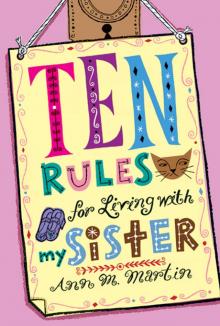 Ten Rules for Living With My Sister
Ten Rules for Living With My Sister With You and Without You
With You and Without You Baby-Sitters' Island Adventure
Baby-Sitters' Island Adventure Karen's Fishing Trip
Karen's Fishing Trip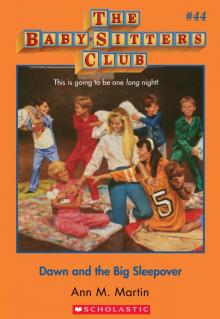 Dawn and the Big Sleepover
Dawn and the Big Sleepover New York, New York!
New York, New York! Ten Kids, No Pets
Ten Kids, No Pets Happy Holidays, Jessi
Happy Holidays, Jessi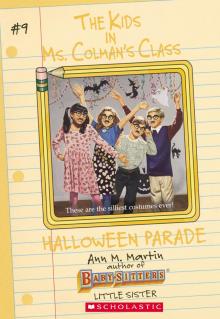 Halloween Parade
Halloween Parade Karen's New Holiday
Karen's New Holiday Kristy Power!
Kristy Power! Karen's Wish
Karen's Wish Claudia and the Mystery in the Painting
Claudia and the Mystery in the Painting Karen's Stepmother
Karen's Stepmother Abby in Wonderland
Abby in Wonderland Karen's Snow Day
Karen's Snow Day Kristy and the Secret of Susan
Kristy and the Secret of Susan Karen's Pony Camp
Karen's Pony Camp Karen's School Trip
Karen's School Trip Mary Anne to the Rescue
Mary Anne to the Rescue Karen's Unicorn
Karen's Unicorn Abby and the Notorious Neighbor
Abby and the Notorious Neighbor Stacey and the Haunted Masquerade
Stacey and the Haunted Masquerade Claudia Gets Her Guy
Claudia Gets Her Guy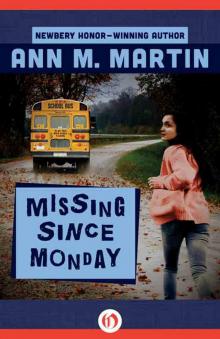 Missing Since Monday
Missing Since Monday Stacey's Choice
Stacey's Choice Stacey's Ex-Best Friend
Stacey's Ex-Best Friend Karen's New Teacher
Karen's New Teacher Karen's Accident
Karen's Accident Karen's Lucky Penny
Karen's Lucky Penny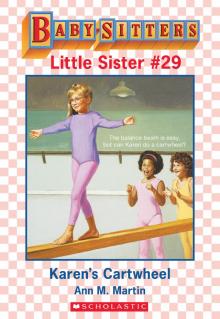 Karen's Cartwheel
Karen's Cartwheel Karen's Puppet Show
Karen's Puppet Show Spelling Bee
Spelling Bee Stacey's Problem
Stacey's Problem Stacey and the Stolen Hearts
Stacey and the Stolen Hearts Karen's Surprise
Karen's Surprise Karen's Worst Day
Karen's Worst Day The Ghost at Dawn's House
The Ghost at Dawn's House Karen's Big Sister
Karen's Big Sister Karen's Easter Parade
Karen's Easter Parade Mary Anne and the Silent Witness
Mary Anne and the Silent Witness Karen's Swim Meet
Karen's Swim Meet Mary Anne's Revenge
Mary Anne's Revenge Karen's Mystery
Karen's Mystery Stacey and the Mystery Money
Stacey and the Mystery Money Dawn and the Disappearing Dogs
Dawn and the Disappearing Dogs Karen's Christmas Tree
Karen's Christmas Tree Welcome to Camden Falls
Welcome to Camden Falls Karen's Pilgrim
Karen's Pilgrim Dawn and the Halloween Mystery
Dawn and the Halloween Mystery Mary Anne in the Middle
Mary Anne in the Middle Karen's Toys
Karen's Toys Kristy's Great Idea
Kristy's Great Idea Claudia and the Middle School Mystery
Claudia and the Middle School Mystery Karen's Big Weekend
Karen's Big Weekend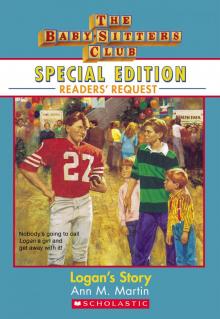 Logan's Story
Logan's Story Karen's Yo-Yo
Karen's Yo-Yo Kristy's Book
Kristy's Book Mallory and the Ghost Cat
Mallory and the Ghost Cat Mary Anne and the Music
Mary Anne and the Music Karen's Tattletale
Karen's Tattletale Karen's County Fair
Karen's County Fair Karen's Mermaid
Karen's Mermaid Snowbound
Snowbound Karen's Movie
Karen's Movie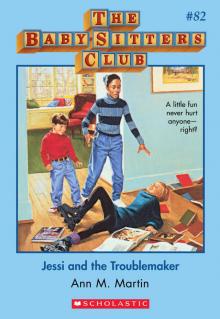 Jessi and the Troublemaker
Jessi and the Troublemaker Baby-Sitters at Shadow Lake
Baby-Sitters at Shadow Lake Mallory on Strike
Mallory on Strike Jessi's Baby-Sitter
Jessi's Baby-Sitter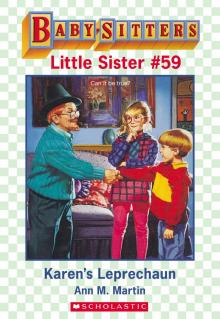 Karen's Leprechaun
Karen's Leprechaun Claudia and the Phantom Phone Calls
Claudia and the Phantom Phone Calls Karen's Good-Bye
Karen's Good-Bye Karen's Figure Eight
Karen's Figure Eight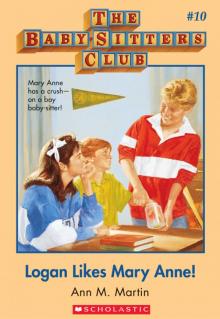 Logan Likes Mary Anne!
Logan Likes Mary Anne! Mary Anne and the Zoo Mystery
Mary Anne and the Zoo Mystery Missy Piggle-Wiggle and the Whatever Cure
Missy Piggle-Wiggle and the Whatever Cure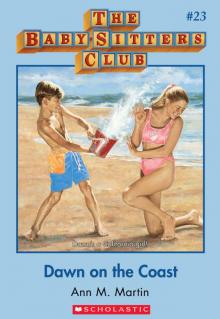 Dawn on the Coast
Dawn on the Coast Stacey and the Cheerleaders
Stacey and the Cheerleaders Claudia and the Clue in the Photograph
Claudia and the Clue in the Photograph Karen's New Friend
Karen's New Friend Mallory and the Trouble With Twins
Mallory and the Trouble With Twins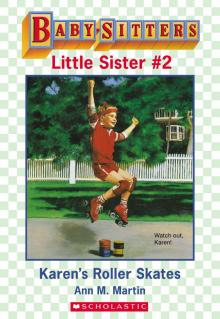 Karen's Roller Skates
Karen's Roller Skates Abby and the Best Kid Ever
Abby and the Best Kid Ever Poor Mallory!
Poor Mallory! Karen's Witch
Karen's Witch Karen's Grandmothers
Karen's Grandmothers Slam Book
Slam Book Karen's School Picture
Karen's School Picture Karen's Reindeer
Karen's Reindeer Kristy's Big Day
Kristy's Big Day The Long Way Home
The Long Way Home Karen's Sleigh Ride
Karen's Sleigh Ride On Christmas Eve
On Christmas Eve Karen's Copycat
Karen's Copycat Karen's Ice Skates
Karen's Ice Skates Claudia and the Little Liar
Claudia and the Little Liar Abby the Bad Sport
Abby the Bad Sport The Baby-Sitters Club #5: Dawn and the Impossible Three
The Baby-Sitters Club #5: Dawn and the Impossible Three Abby's Book
Abby's Book Karen's Big Top
Karen's Big Top Main Street #8: Special Delivery
Main Street #8: Special Delivery Kristy and the Kidnapper
Kristy and the Kidnapper Karen's Ski Trip
Karen's Ski Trip Karen's Hurricane
Karen's Hurricane Stacey and the Mystery at the Mall
Stacey and the Mystery at the Mall Jessi and the Superbrat
Jessi and the Superbrat Kristy and the Baby Parade
Kristy and the Baby Parade Karen's New Bike
Karen's New Bike Karen's Big City Mystery
Karen's Big City Mystery Baby-Sitters' European Vacation
Baby-Sitters' European Vacation Hello, Mallory
Hello, Mallory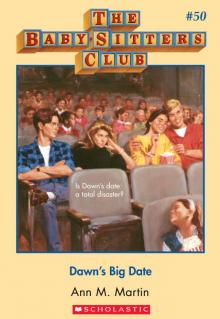 Dawn's Big Date
Dawn's Big Date Karen's Christmas Carol
Karen's Christmas Carol Jessi's Horrible Prank
Jessi's Horrible Prank Kristy and the Missing Fortune
Kristy and the Missing Fortune Kristy and the Haunted Mansion
Kristy and the Haunted Mansion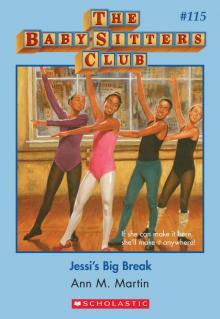 Jessi's Big Break
Jessi's Big Break Karen's Pony
Karen's Pony Welcome Home, Mary Anne
Welcome Home, Mary Anne Stacey the Math Whiz
Stacey the Math Whiz September Surprises
September Surprises Bummer Summer
Bummer Summer Karen's Secret
Karen's Secret Abby's Twin
Abby's Twin Main Street #4: Best Friends
Main Street #4: Best Friends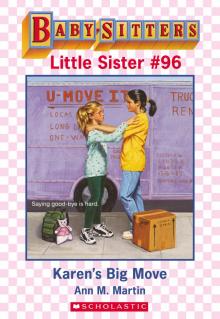 Karen's Big Move
Karen's Big Move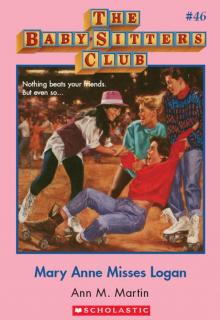 Mary Anne Misses Logan
Mary Anne Misses Logan Stacey's Book
Stacey's Book Claudia and the Perfect Boy
Claudia and the Perfect Boy Holiday Time
Holiday Time Stacey's Broken Heart
Stacey's Broken Heart Karen's Field Day
Karen's Field Day Kristy's Worst Idea
Kristy's Worst Idea Dawn and the Older Boy
Dawn and the Older Boy Karen's Brothers
Karen's Brothers Claudia's Friend
Claudia's Friend Mary Anne and the Haunted Bookstore
Mary Anne and the Haunted Bookstore Dawn and Whitney, Friends Forever
Dawn and Whitney, Friends Forever Summer School
Summer School Karen's Birthday
Karen's Birthday Karen's Black Cat
Karen's Black Cat Stacey McGill... Matchmaker?
Stacey McGill... Matchmaker? Claudia's Book
Claudia's Book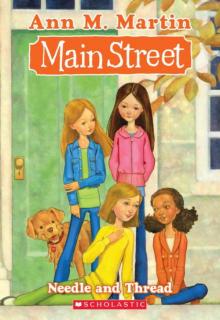 Main Street #2: Needle and Thread
Main Street #2: Needle and Thread Karen's Runaway Turkey
Karen's Runaway Turkey Karen's Campout
Karen's Campout Karen's Bunny
Karen's Bunny Claudia and the New Girl
Claudia and the New Girl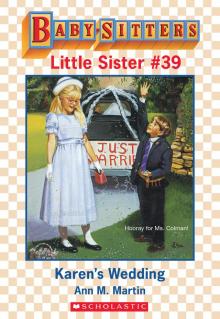 Karen's Wedding
Karen's Wedding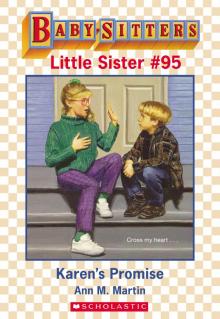 Karen's Promise
Karen's Promise Karen's Snow Princess
Karen's Snow Princess Claudia Kishi, Middle School Dropout
Claudia Kishi, Middle School Dropout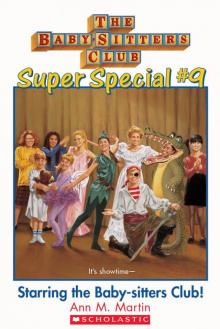 Starring the Baby-Sitters Club!
Starring the Baby-Sitters Club! Kristy for President
Kristy for President California Girls!
California Girls! Maid Mary Anne
Maid Mary Anne Abby's Un-Valentine
Abby's Un-Valentine Stacey's Secret Friend
Stacey's Secret Friend Karen's Haunted House
Karen's Haunted House Claudia and Crazy Peaches
Claudia and Crazy Peaches Karen's Prize
Karen's Prize Get Well Soon, Mallory!
Get Well Soon, Mallory! Karen's Doll Hospital
Karen's Doll Hospital Karen's Newspaper
Karen's Newspaper Karen's Toothache
Karen's Toothache Mary Anne and Miss Priss
Mary Anne and Miss Priss Abby's Lucky Thirteen
Abby's Lucky Thirteen The Secret Book Club
The Secret Book Club The All-New Mallory Pike
The All-New Mallory Pike Karen's Turkey Day
Karen's Turkey Day Karen's Magician
Karen's Magician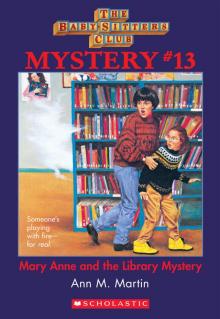 Mary Anne and the Library Mystery
Mary Anne and the Library Mystery Diary One: Dawn, Sunny, Maggie, Amalia, and Ducky
Diary One: Dawn, Sunny, Maggie, Amalia, and Ducky Mary Anne and the Secret in the Attic
Mary Anne and the Secret in the Attic Kristy and the Mother's Day Surprise
Kristy and the Mother's Day Surprise Karen's in Love
Karen's in Love Welcome to the BSC, Abby
Welcome to the BSC, Abby Karen's Kittycat Club
Karen's Kittycat Club The Mystery at Claudia's House
The Mystery at Claudia's House The Truth About Stacey
The Truth About Stacey Karen's Bully
Karen's Bully Karen's Gift
Karen's Gift BSC in the USA
BSC in the USA Everything for a Dog
Everything for a Dog Dawn and the We Love Kids Club
Dawn and the We Love Kids Club Karen's Ghost
Karen's Ghost Stacey's Lie
Stacey's Lie Jessi's Secret Language
Jessi's Secret Language Kristy and the Missing Child
Kristy and the Missing Child Better to Wish
Better to Wish Baby-Sitters on Board!
Baby-Sitters on Board!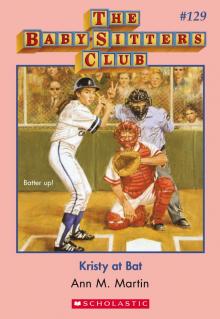 Kristy at Bat
Kristy at Bat Everything Changes
Everything Changes Don't Give Up, Mallory
Don't Give Up, Mallory A Dog's Life: The Autobiography of a Stray
A Dog's Life: The Autobiography of a Stray Karen's Big Lie
Karen's Big Lie Karen's Show and Share
Karen's Show and Share Mallory Hates Boys (and Gym)
Mallory Hates Boys (and Gym) Diary Two: Dawn, Sunny, Maggie, Amalia, and Ducky
Diary Two: Dawn, Sunny, Maggie, Amalia, and Ducky Karen's Pen Pal
Karen's Pen Pal Claudia and the Friendship Feud
Claudia and the Friendship Feud Karen's Secret Valentine
Karen's Secret Valentine Keep Out, Claudia!
Keep Out, Claudia! Aloha, Baby-Sitters!
Aloha, Baby-Sitters! Welcome Back, Stacey
Welcome Back, Stacey Jessi Ramsey, Pet-Sitter
Jessi Ramsey, Pet-Sitter Karen's Pizza Party
Karen's Pizza Party Kristy and the Dirty Diapers
Kristy and the Dirty Diapers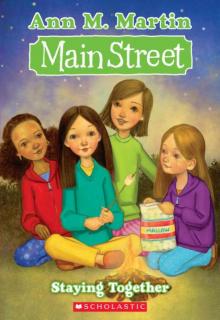 Staying Together
Staying Together Dawn and the Surfer Ghost
Dawn and the Surfer Ghost Claudia Makes Up Her Mind
Claudia Makes Up Her Mind Jessi's Gold Medal
Jessi's Gold Medal Karen's Kite
Karen's Kite Baby Animal Zoo
Baby Animal Zoo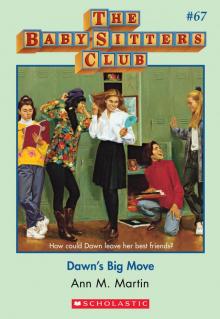 Dawn's Big Move
Dawn's Big Move Karen's Big Joke
Karen's Big Joke Karen's Lemonade Stand
Karen's Lemonade Stand Ma and Pa Dracula
Ma and Pa Dracula Baby-Sitters' Haunted House
Baby-Sitters' Haunted House Abby and the Mystery Baby
Abby and the Mystery Baby Home Is the Place
Home Is the Place Karen's Grandad
Karen's Grandad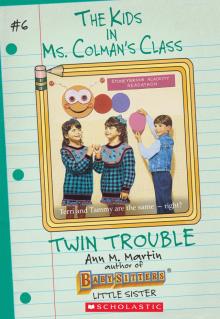 Twin Trouble
Twin Trouble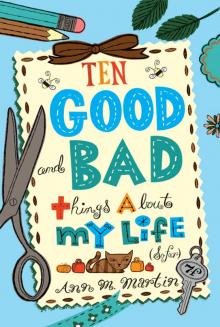 Ten Good and Bad Things About My Life (So Far)
Ten Good and Bad Things About My Life (So Far) Diary Two
Diary Two Baby-Sitters Club 027
Baby-Sitters Club 027 Claudia and the Mystery Painting
Claudia and the Mystery Painting Diary One
Diary One Baby-Sitters Club 037
Baby-Sitters Club 037 Baby-Sitters Club 028
Baby-Sitters Club 028 Baby-Sitters Club 085
Baby-Sitters Club 085 Dawn Schaffer Undercover Baby-Sitter
Dawn Schaffer Undercover Baby-Sitter Jessi's Babysitter
Jessi's Babysitter The Baby-Sitters Club #110: Abby the Bad Sport (Baby-Sitters Club, The)
The Baby-Sitters Club #110: Abby the Bad Sport (Baby-Sitters Club, The) Karen's Little Sister
Karen's Little Sister Baby-Sitters Club 058
Baby-Sitters Club 058 Claudia And The Genius On Elm St.
Claudia And The Genius On Elm St. Missy Piggle-Wiggle and the Sticky-Fingers Cure
Missy Piggle-Wiggle and the Sticky-Fingers Cure Kristy and Kidnapper
Kristy and Kidnapper Baby-Sitters Club 041
Baby-Sitters Club 041 Karen's Bunny Trouble
Karen's Bunny Trouble Baby-Sitters Club 032
Baby-Sitters Club 032 Diary Three
Diary Three Christmas Chiller
Christmas Chiller Karen's Half-Birthday
Karen's Half-Birthday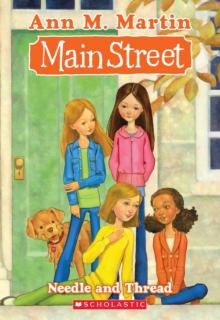 Needle and Thread
Needle and Thread Secret Life of Mary Anne Spier
Secret Life of Mary Anne Spier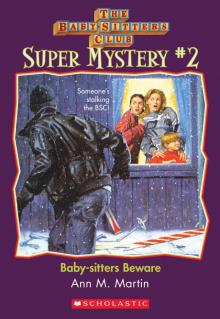 Baby-Sitters Beware
Baby-Sitters Beware Claudia Kishi, Middle School Drop-Out
Claudia Kishi, Middle School Drop-Out Logan Likes Mary Anne !
Logan Likes Mary Anne ! Baby-Sitters Club 061
Baby-Sitters Club 061 Best Friends
Best Friends Baby-Sitters Club 031
Baby-Sitters Club 031 Karen's Little Witch
Karen's Little Witch Jessi Ramsey, Petsitter
Jessi Ramsey, Petsitter Baby-Sitters Club 123
Baby-Sitters Club 123 Baby-Sitters Club 059
Baby-Sitters Club 059 Baby-Sitters Club 033
Baby-Sitters Club 033 Baby-Sitters Club 060
Baby-Sitters Club 060 Baby-Sitters Club 094
Baby-Sitters Club 094 The Baby-Sitters Club #99: Stacey's Broken Heart
The Baby-Sitters Club #99: Stacey's Broken Heart The Baby-Sitters Club #109: Mary Anne to the Rescue (Baby-Sitters Club, The)
The Baby-Sitters Club #109: Mary Anne to the Rescue (Baby-Sitters Club, The) Mystery At Claudia's House
Mystery At Claudia's House Claudia And The Sad Goodbye
Claudia And The Sad Goodbye Mary Anne's Big Break-Up
Mary Anne's Big Break-Up Baby-Sitters Club 025
Baby-Sitters Club 025 Baby-Sitters Club 042
Baby-Sitters Club 042 Stacey and the Mystery of the Empty House
Stacey and the Mystery of the Empty House Karen's Baby-Sitter
Karen's Baby-Sitter Claudia's Friendship Feud
Claudia's Friendship Feud Baby-Sitters Club 090
Baby-Sitters Club 090 Baby-Sitters Club 021
Baby-Sitters Club 021 Baby-Sitters Club 056
Baby-Sitters Club 056 Baby-Sitters Club 040
Baby-Sitters Club 040 The Baby-Sitters Club #108: Don't Give Up, Mallory (Baby-Sitters Club, The)
The Baby-Sitters Club #108: Don't Give Up, Mallory (Baby-Sitters Club, The) Dawn and the Impossible Three
Dawn and the Impossible Three The Snow War
The Snow War Special Delivery
Special Delivery Baby-Sitters Club 057
Baby-Sitters Club 057 Mary Anne And Too Many Babies
Mary Anne And Too Many Babies Baby-Sitters Club 030
Baby-Sitters Club 030